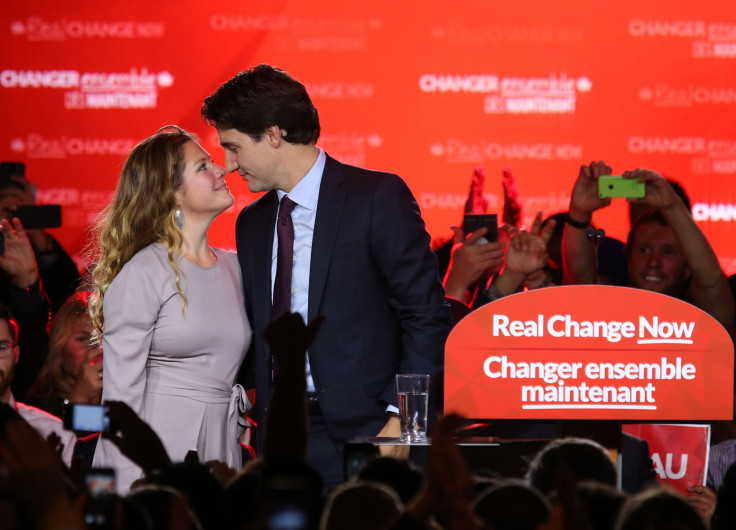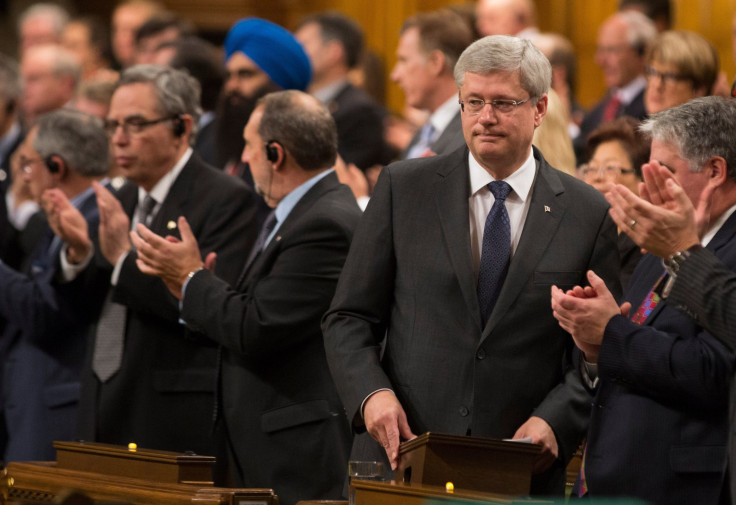Canada's Election 2015 Results: Liberal Party Wins, Stephen Harper Concedes Defeat

UPDATE: 12:30 a.m. EDT – Canada's Liberal Party leader Justin Trudeau pulled off an astounding election victory late on Monday, unseating Prime Minister Stephen Harper's Conservatives, according to reports.
The Liberals seized a parliamentary majority and Harper conceded defeat, ending the Conservatives’ nine-year reign, Reuters reported.
Original story:
With polls having closed in nearly all provinces, multiple news outlets in Canada were projecting the Liberal Party's Justin Trudeau to have been elected the nation's next prime minister. In addition, Trudeau's Liberals were projected to win a majority in parliament, CBC News reported.
As of 10 p.m. EDT, Liberals were leading in 89 ridings, the Conservatives in 49 and the NDP in 13 and the Bloc Quebecois and Green Party in one each. The Conservative victories so far were for Gérard Deltell in the riding of Louis-Saint-Laurent in the Quebec City area and Martin Shields elected in Bow River, Alberta, the Star reported.
The Conservative Party won just 36 percent of the popular vote in 2006, was re-elected in 2008 with 36 percent and was once again re-elected in 2011 with just under 38 percent. Prime Minister Stephen Harper moved to dissolve Parliament in August, beginning the country’s longest campaign season since 1872, the Washington Post reported.
Harper has been the country’s prime minister for nine years, and has shifted Canada to the center-right, the Associated Press reported. He has lowered sales and corporate taxes, avoided climate change legislation and fought with the Obama administration over the controversial Keystone XL pipeline. In August, Harper was the subject of a scathing critique in the New York Times by Toronto writer Stephen Marche, titled "The Closing of the Canadian Mind."
The election Monday night pitted Harper against Liberal leader Trudeau, son of the late former Prime Minister Pierre Trudeau, who led the country from 1968 to 1979, and again from 1980 to 1984.

Nearly 26.4 million voters were eligible to cast ballots at 20,000 polling places, the Canadian Press reported. The campaign, which lasted 78 days, was the longest campaign in modern Canadian history, and included a larger number of candidates from various parties including 338 from the Conservative Party of Canada, 338 from the Liberal Party of Canada, 338 from the New Democratic Party, 336 from the Green Party of Canada and five from the Pirate Party of Canada.
No matter which party ended up winning, a minority government in the 338-seat Parliament appeared likely, said Tom Flanagan, Harper's former campaign manager told the AP. Liberals and the New Democrats had said if the Conservatives ended up winning the most seats, they would band together to bring down the Harper government in a parliamentary vote. Harper raised eyebrows when he made the Islamic face veil the focus of his campaign, and when he posed alongside former crack-smoking Toronto Mayor Rob Ford earlier this week.
One of the top issues in the Canadian election included the country’s stagnating economy. Trudeau said he would spend on infrastructure projects and run modest budget deficits to stimulate the economy, the New York Times reported. Harper and New Democratic party leader Tom Mulcair promised balanced budgets.
Another hot issue was the Trans-Pacific Partnership trade pact. Harper hailed the deal as a way to revitalize the economy, while Mulcair argued that it threatened thousands of jobs in Ontario and he would not be bound by it. Trudeau generally favors free trade deals but said he would not announce his position until the full text is made public.
© Copyright IBTimes 2025. All rights reserved.






















